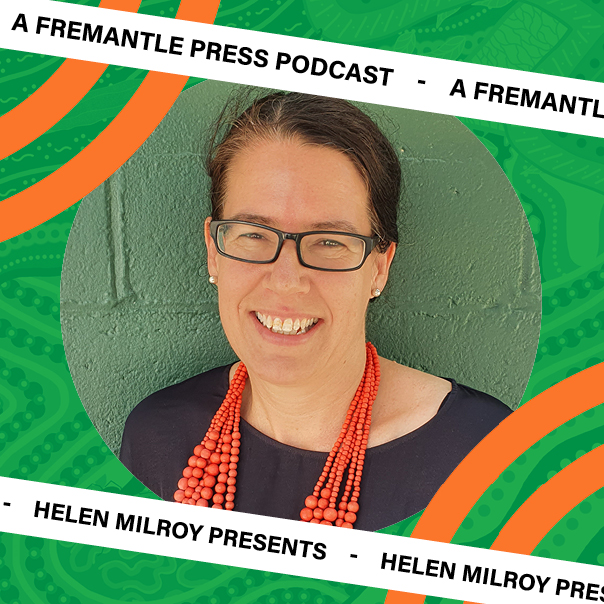Episode Transcript
[00:00:05] Speaker A: Hello and welcome to how to avoid a happy life, the podcast. This podcast is a companion to how to avoid a happy Life, a memoir by Julia Lawrence, published by Fremantle Press. But you don't need to have read her story to enjoy it. This episode was recorded on Whadjuk Noongar Budja, and we acknowledge the continuing custodianship of this land and the great storytelling traditions of the noongar people.
This episode is called Fast Food. I'm Danae Gibson and before we start this episode, I'm going to talk a little bit to Julia about why this topic.
[00:00:40] Speaker B: So this was a topic that I think is really important because work is one of those things that often doesn't get mentioned in memoirs or novels or anything like that, and I actually think it is a really important part of life. It's also one of the reasons why you don't really hear about working class life very much. Because the people who write memoirs tend to be middle class and people with enough leisure to actually write a memoir. And I think it's important to foreground how vital work is in the formation of you as a person. So I wanted to focus on my very first job.
[00:01:23] Speaker A: Did you keep diaries during this period of your first job?
[00:01:27] Speaker B: I most certainly did, yes. My first payslip is, which I think was I got $2.93 an hour and it was pasted into my diary. I was very proud.
[00:01:39] Speaker A: Were there oily stains from the fast food that you dealt with?
[00:01:43] Speaker B: I didn't generally take my diary to work, but honestly, there were stains everywhere else.
[00:01:55] Speaker C: Welcome to how to avoid a happy life, the podcast. I'm Julia Lawrence.
Content this episode contains references to violence.
The episode is called what I learnt from working in fast food.
It was January 1984 and I was 14 and one quarter when I started my first job at hungry Jacks in the outer bogan suburbs of Perth.
There was one McDonalds store in Perth which had opened in 1982, so if you wanted burger related employment in the suburbs, there was still only one place to go.
The reason I applied for a job at hungry Jacks was because the 16 year old girl I was obsessed with worked there.
Having regularly stalked her at school over the previous six months, I thought I would now mix it up by stalking her in paid employment. Also, because of said obsession, I had started to take some care about my appearance. The haphazard provision of clothing from my mother, who was on the single parent benefit, would no longer do.
It was through my obsession that I learnt what the word bogan meant when applied to choices of faberge jeans and desert boots.
Before that, being a bogan was no more remarkable than the colour of my hair. Now I had aspirations.
These aspirations required money, and the only way I was going to get any money was to work. So after filling in the requisite forms and getting my mother's approval, I turned up at hungry Jack's Gosnell's to receive my training, along with a handful of other kids who had just passed the legal age for employment.
In the back room, which served as a break room, change room and smoking room, we sat and watched training videos straight from the USA.
The manager explained that we needed to replace Burger King with hungry jacks. Apart from that, what we saw was what we were to do.
The things I remember most were, firstly, the importance of smiling at people as soon as they entered the store, a compulsory pleasantness of demeanour that I have maintained throughout my working life, and secondly, the importance of suggestive selling.
Suggestive selling meant that if someone wanted a burger, we asked if they wanted Friesen. If they asked for a burger and fries, we asked if they wanted a drink. If they bought a meal deal, we suggested they add the deep fried apple pie, a sausage roll shaped object that hardened the arteries of anyone who consumed it.
If they ordered everything on the menu, we asked if they wanted to increase the serving size. We all shifted uncomfortably in the training commercial brashness, being foreign to early eighties Perth. But we would deliver the statistics on how often, if it was suggested, people already hungry would order more than they had planned. If we wanted shifts, it was in our interest to hawk the wares. What they didn't mention was that working on front counter was a privilege that was far off.
First we had to be issued our brown, orange and yellow outfits made of thick nylon. Our hair in hair nets under our peaked caps, required to purchase black shoes with soles sturdy enough to be able to perambulate around the floor, which always seemed as slippery with grease as our skin would become after a shift.
Then, once our shifts were allocated, we would start on our first station, the broiler steamer.
On broiler steamer duty, you began to learn what it was to work as a team. I was boggled that the burger makers, the undisputed stars of the store, ranked even more highly than the front counter staff, and they knew how many patties that we would need ready for each peak period or dinner rush.
Our job was to go into the freezer room, extract the correct number and size of patties from the cardboard boxes and feed them into the broiler steamer.
They had to be placed precisely, no edges touching, as the patties made their way over the grill, spitting globules of fat as they heated and browned and then caught and placed in the steamer at the other end. You were not to let the falling patties linger in the tray before putting them in the steamer or they would get soggy. So you had to learn the timing and rhythm of the contraption while keeping your sweat from dripping on said patties at the end of the night. It was someone's job to empty all of the collected fat from the bottom of the machine, scrub the tray, and replace it ready for the next day.
Once you had mastered the broiler steamer, you'd be trained on the fry station.
There were baskets which lowered the frozen fries and occasionally fish and chicken patties into the vats of oil.
You could not just let the fries cook for the duration of the timer. If you didn't want globs of fries sticking together, you needed to regularly and violently jiggle the handle as they cooked. When the timer went off, you needed not only to lift the basket from the vat but to shake it vigorously so that the fries were crispy rather than soggy. You then tipped the fries into a rounded trough, where you applied salt with two shakes, then distributed the salt by pushing the fries around the trough with a scoop.
During one training session, I remember one of the managers showing a video, also from the US, on the financial impost. If staff shook the salt three times instead of two, it must have been a relief when the concern about heart disease meant that the salt was no longer applied by the staff at all.
The fries station was hotter than the broiler steamer, given that there were both the vats and the hot light trained on the cooked fries. But its role was further up the hierarchy, which meant that by definition it was more desirable, thus introducing me early into the workplace truth that it matters not what you do, it only matters how people perceive what you do.
After I entered year ten, a month after I started working, I remember remarking to my mother that those of us who had jobs were more mature than those who didn't. Our willingness to work was regarded positively by our teachers, parents, and older people.
We were from a working class which did not yet vote liberal, and you weren't aspiring to anything except a regular job, by which means you could pay your own way through life. Rather than being a dole bludger, your ability to stay out of trouble and or off the dole was often reliant on your ability to tolerate work growing up, I did not know a single person who had been to university.
Even our teachers were the graduates of teachers college.
I was aware that lawyers and doctors needed to go to uni, but neither possibility seemed even vaguely in reach to me and my school friends. Although I was on the winning debating team in year ten and was always told by teachers that I had a propensity to argue, which was already noted and perhaps suited to the law.
So working early was early training to keep working, which did not mean that there were not some jobs more desirable than others.
We used to give free food to members of the police because they came to our aid so often. From this I learnt that benefits may accrue to your position regardless of your personal qualities, and there were perks even of working at hungry jacks. I had always associated hungry jacks with city outings, so when I was able to make my own burgers and be charged half the price for them, I went all out.
I made burgers with six pieces of bacon and a stack of cheese, which I would microwave and then top off with such extravagant amounts of mayonnaise and ketchup that I had to lick the torrent of juices from the burger before I could safely eat it in the privacy of the break room. For dessert, I poured a modest amount of soft serve into a cup and then pressed the pump pack of caramel until the cup was filled. It was only when the scale started to demonstrate the extent of my indulgence that I was induced to scale it back.
Having gone to public schools and grown up with my fair share of authoritarian figures, I was used to both being yelled at generally and specifically, and witnessing the public humiliation of others. It was instructive that the same range of personality types found at school, from the competent to the indolent, from the generally enraged to the meek, existed in the workplace.
The difference was that there were fewer targets for the bullying types, and it was the bullying types that got the chief management roles.
These people determined what shift you got and how fast you progressed to front counter or burger making.
I began to hone my ability to appease the bullies by appearing compliant, but only up to a point. Union membership was compulsory, and when one of the managers kept on making new girls and sometimes boys cry by shouting at them in front of customers and staff alike, I was one of the first to agree that something needed to be done and put my name to a petition we went to the union with to remove the offending manager. He wasn't removed, but he was chastened.
However, I wished fervently for that yelling manager. On one Saturday afternoon shift in later 1984, I had by this time been promoted to front counter and practised my winning smile on all customers who came through the door.
Because the restaurant had begun staying open until the early hours of the morning. On weekends it was the only place for the Armadale boys and the Ghazi boys to go after the pub shut. So not infrequently, fights broke out in the restaurant.
One time, while my mother was waiting in a back booth, a gauzy boy broke the chair free from its fixed stand and proceeded to whack it over the head of an Armadale boy. Before everyone else joined in, Mum cowed at the back and I mopped up the blood afterwards. While this was distasteful, I didn't feel in any danger of violence. The boys were always focused on each other. But on the Saturday afternoon in question, a small group of boys ambled up to the front counter. The store was relatively quiet and they weren't rowdy enough to attract the attention of the manager who was there, a pleasant young man who enjoyed chatting with staff as they worked. But as they approached me, I felt that something was amiss. They were unnaturally quiet. They did not respond to my welcome to hungry jacks and I take your order delivered with my trademark smile.
The main guy, in his early twenties with a scrappy look about him, ordered what seemed to be an excessive amount of food for the group that was present.
He sneered at me as he was ordering, and when I asked if he would like this extra or that suggestive selling, no matter the personal cost, he snarled, yeah, why not?
After I called the order over the pa, I totalled the bill and asked for him to procure the required amount of money.
In response, he produced from his jeans pocket a folded knife, which he unfolded and pointed in my direction. Nah, he said, we're not paying for that. I tried to get the attention of the manager, who was having a laugh with the guy manning the fry station. Well, I said, if you don't pay, you're not getting your food. Oh, we're getting our food all right, he said.
Not if you don't pay, you not. I said. I was firm.
I was a granddaughter of a copper. I had been trained to put the interest of the company first. No Gosnell's bog was going to be getting free food on my watch.
Chatting manager continued to chat. The guy leaned in a little, gazing at my name badge. Julie, he said, if you don't give us that food, we're going to come back and get you when your shift finishes. Go on, then, I said. Which is what you said to people, girls or boys, who threatened to get you after school.
I can't remember what happened next, whether someone walked to the front counter or other customers came in, only that the large order went uncollected. The police came and my mother was called to come and get me.
I remember feeling pleased that I didn't clock off until after the police left, meaning I was getting paid, even though I was waiting to be interviewed instead of facing the dinner rush.
I decided after that that it was time to move on.
The object of my obsession had disappointedly decided that her working life lay elsewhere soon after I'd arrived. It had nothing to do with me starting, I'm sure. So I got a job closer to home at Chicken Treat, leaving behind the persistent odour of beef fat, the memory of the failed burger robbery and the need to mop up blood on a Saturday night.
After that, my experience of employment could only get better.
[00:17:29] Speaker D: How to avoid a happy life the podcast was produced by Danae Gibson, who has my eternal gratitude and recorded at RTRFM. The video for it was edited by Fremantle Press. Music was written by late night shopping Nikki Jones and Sean Salmon. The podcast includes voice work by Nicky Jones and Zoe Warwick. Thank you all for listening.


